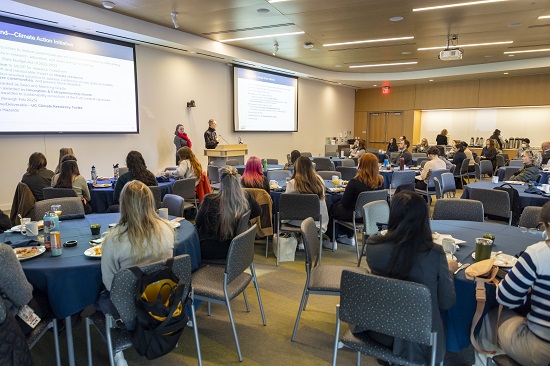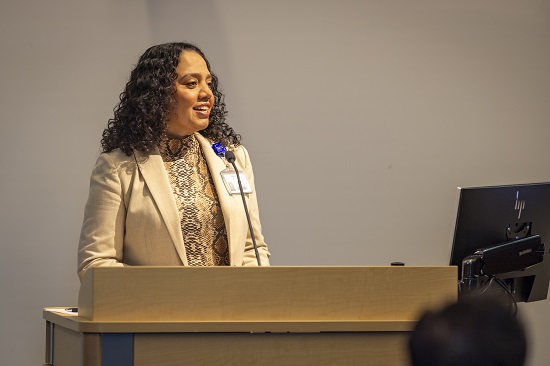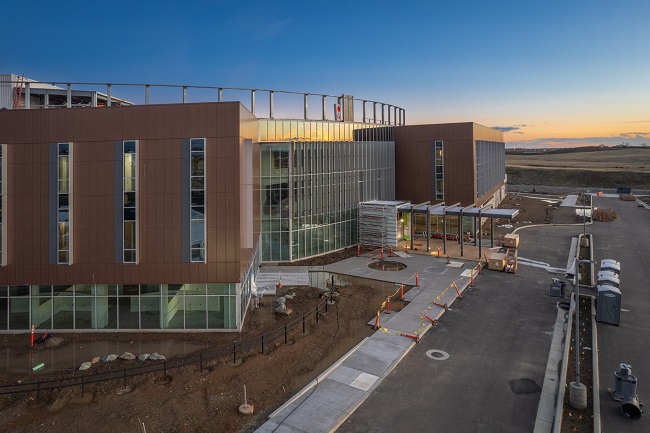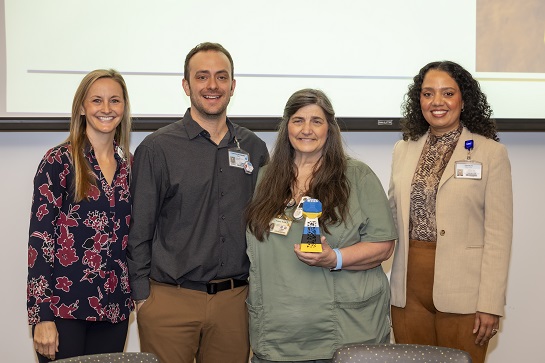UC Davis Health Summit features sustainability leaders, impact of departmental programs
The second UC Davis Health Sustainability Summit, held on February 12, 2025, explored strategies to reduce the organization’s environmental impact and highlighted recent successes across the health system.

With nearly 100 participants in attendance, speakers from the departments of emergency medicine, radiology, campus planning and grounds, and the Clinical Practice Council brought a holistic view of reducing waste, lowering water and energy use, and improving resilience to climate hazards.
Speaker David Barnes, a physician in the Department of Emergency Medicine, said, “As a society, we rightfully prioritize patient care and safety, but until recently, we’ve been ignorant to the ecological harms and financial waste – both significant and measurable – inherent to the delivery of modern health care.”
That mindset is changing. Initiatives at UC Davis Health’s main campus, the forthcoming 48X, and sites like the Folsom Care Center are delivering tangible results, sparking important discussions among attendees.
“The level of interest and engagement by summit participants was palpable. I think that’s because people realize it’s no longer acceptable to ignore the waste associated with delivering 21st-century health care,” Barnes said.

Jita Buño, associate COO of UC Davis Health and a speaker said that the health system’s commitment to sustainability is a key part of its “Believe in Better” strategic direction. That means targeting the long-term effects of carbon emissions, transforming patient care and operations, and setting an example for other health systems.
Buño added, “I can’t think of a better place to tackle these challenges than UC Davis Health. Among the most compelling aspects of our organization is its capacity for change. That is demonstrated in how departments throughout UC Davis Health drive innovation and results, from energy consumption to patient resiliency.”
48X, Folsom Medical Care Clinic become ‘firsts’ in California, UC
UC Davis Health campus planner Steve Chaitow highlighted successful initiatives, including smarter building design to reduce energy consumption and improve the staff and patient experience, resilient structures to withstand flooding and heat, and better landscaping to lower water consumption.
William Pevec, a physician and professor emeritus in Vascular and Endovascular Surgery, said, “The built environment is a major but often under-recognized contributor to greenhouse gas emissions. It was informative to learn about the extensive design features incorporated into the new UC Davis Health buildings and landscaping promoting environmental sustainability.”

The new Folsom Medical Care Clinic is setting a high bar for sustainability. It is among the first Sustainable Sites Initiative (SITES) facilities to be completed in California and has earned LEED Gold and LEED Silver designations for sustainable building design. Project Manager Lisa Hinton told the summit audience that the center is also one of the first University of California projects to integrate UC’s new Sustainable Practices Policy fully.
She noted that sustainability is embedded in every aspect of the center, including energy-efficient ventilation systems, the use of healthy, sustainable materials, and designs that promote connections to nature.
Radiology’s Tammy Boak named sustainability champion
UC Davis Health has selected Tammy Boak as its 2025 Sustainability Champion. This award recognizes one individual each year for their leadership and impact on reducing waste, lowering water and energy use, and improving resilience to climate hazards.
As a materials management specialist in Radiology, Boak controls many of the products and devices that UC Davis Health purchases for the department. In this capacity, Boak has implemented a series of sustainability initiatives, including bulk purchasing, waste reduction during paracentesis procedures, and the adoption of reusable procedural instruments.
The director of Radiology Sustainability, Andrew Hernandez, said, “Tammy’s commitment to sustainability is unwavering. She consistently looks at purchasing and procurement through a sustainability lens and persists through the difficulties she encounters.”
Most recently, Boak has helped to lead the transition to reusable isolation gowns in radiology, the purchase of syringeless multi-dose contrast injectors, the rollout of reusable patient belongings bags in outpatient centers, and the implementation of a recycling program for iodine waste.
Boak received the award at the UC Davis Health Sustainability Summit.

Tammy Boak, holding award, at the UC Davis Health Sustainability Summit, where she was named UC Davis Health Sustainability Champion.
Meanwhile, UC Davis Health’s 48X project is pushing beyond traditional sustainability standards. It is designed to reduce energy usage by 35% compared to the LEED baseline.
At the summit, facilities planning specialist Creed Kampa previewed key energy-saving features of the 48X project – high-performance exterior insulation and solar shading, efficient HVAC and water heating systems, LED lighting with daylight optimization, and rooftop solar power systems.
Re-imagining landscapes saves water
In 2022, UC Davis Health launched a Turf Reduction Master Plan to transform its landscaping approach. The campus has significantly reduced water usage by changing the composition and maintenance of green spaces.
Erik Skall, UC Davis Health’s grounds and landscape supervisor and another summit speaker, showcased key areas across the Sacramento campus where his teams have replaced the turf with drought-tolerant plants that thrive in the local climate and upgraded irrigation systems to maximize water efficiency.
The result is that UC Davis Health has saved 10.6 million gallons of potable water annually. Other sites are now adopting this approach.
Extreme-heat preparedness kit for seniors
UC Davis Health’s sustainability programs go beyond buildings and focus on patients’ ability to respond to climate hazards. Summit speakers and physicians David Barnes and Katren Tyler from the Department of Emergency Medicine introduced a new Climate Resiliency Toolkit for seniors.
Addressing a growing concern, the toolkit equips seniors, their caregivers, and their families to prepare for and respond to periods of extreme heat. The tools include information on recognizing signs of heat distress, knowing what steps to take when someone is in trouble, and preparing for extreme heat events.
UC Davis Health is ensuring greater climate resilience for our most vulnerable populations by equipping seniors and their support networks with lifesaving knowledge.
Clinical Practice Council invites ideas, reduces waste
When the UC Davis Health Clinical Practice Council stepped up to address sustainability, they brought power in numbers, experience, and insight. Chair Eric Tyrell said the council launched a Sustainability Subcommittee to research and find more efficient and eco-friendly solutions that do not compromise patient care.
Up to 90% of waste has been cut by replacing pre-packaged patient admission and care kits with individual and as-needed supplies. A Sustainability Suggestion Box, open to all UC Davis Health staff, continues to generate new ways to improve operations and minimize waste.
Clinical Leader Liaison Barbara Gumnor and Executive Sponsor Jolene Lonigan lead the Sustainability Subcommittee. By empowering staff and embracing sustainable practices, UC Davis Health is making patient care more efficient and environmentally responsible.
Radiology unveiling opportunities to reduce energy consumption
Close attention and small changes are making a big impact at UC Davis Health’s Radiology Department. Through energy metering of MRI, CT, and PET/CT scanners, UC Davis Health’s Radiology Department has implemented operational strategies to reduce energy consumption of imaging systems.
This includes turning off CT systems at night when they are not in use and ensuring MRI systems, which cannot be turned off, are in their lowest energy state when not in use. In one instance, the team discovered an MRI software issue causing 10% excess energy use at night. Their findings led to a manufacturer’s resolution saving energy not only for UC Davis Health but for health systems worldwide.
More recently, the team conducted comprehensive energy metering of four imaging systems in an outpatient center to identify opportunities for savings, including optimizing HVAC settings for all systems and chilled water settings for MRIs. The results have led to new building standards at UC Davis Health which require comprehensive energy metering of all newly installed CT, MRI, and PET/CT scanners at multiple locations throughout the health system. Additionally, they are exploring opportunities for energy savings during active MRI scanning ensuring the highest achievable diagnostic quality while minimizing the environmental impact, enhancing operational efficiency, and improving patient comfort.
Andrew Hernandez, Director of Radiology Sustainability, explained to the audience that the detailed monitoring, energy quantification, and multi-disciplinary collaborations made these savings possible. These initiatives highlight how small, strategic changes can lead to major sustainability gains in health care.
Never a better time to get involved
The UC Davis Health Sustainability Committee organized the summit, which sustainability director Kristina Bair leads. The committee is entirely volunteer, and Bair encourages others to join the work.
“The committee is comprised of individual contributors and leaders representing dozens of departments throughout UC Davis Health. Our work is meaningful and demonstrates the power of a cross-disciplinary approach to sustainability,” she said.
To get involved, email UCDHSustainability@ucdavis.edu. Connect to the Sustainability Suggestion Box to submit ideas for new ways to improve sustainability at UC Davis Health.
